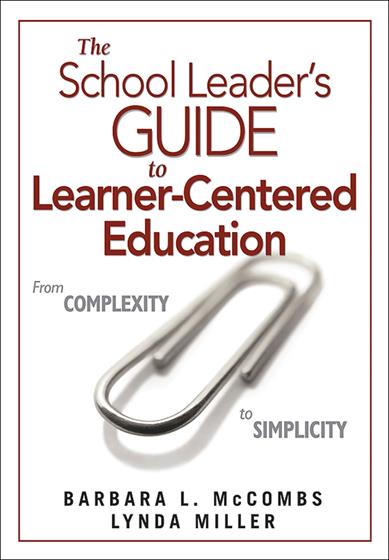Acknowledgments
About the Authors
1. Why This Is a Time for Change
Why Read This Book?
Schools as Living Systems
What Does "Learner-Centered" Mean?
How This Book Is Organized
How Do You Like to Learn?
2. What We Know About Learning and Leading
What Kind of Learner and Leader Are You?
What Does Existing Evidence Say About Leadership?
The "Big Picture" View: An Ecology of Learning Model
What It Means to Be Learner-Centered
A Learner-Centered Educational Model
What Are the New Notions of Schooling as Part of Living Systems?
Self-Reflections
What's Next
3. What the Learner-Centered Model Means for Practice
What It Means to Be a Learner-Centered Leader
What the Research Shows About the Effectiveness of Learner-Centered Models
How the Learner-Centered Principles Translate Into Practice at the School Level
Implications for Leadership and Building Communities of Learners
Self-Reflections
What's Next
4. The Tools Needed for the Journey
Tools for the Journey Within
Tools for a School-Level Assessment System and Leadership Process
Implications of Implementing Learner-Centered Leadership Tools
Tools for Answering the Truly Important Questions
Self-Assessment and Reflection Tools to Chart the Journey
Self-Reflections
What's Next
5. What Learner-Centered Assessment Tools Can Accomplish
What Is Expected of Our Educational System?
How School Leaders Can Provide What Is Wanted
The Big Issues Facing Today's School Leaders
The Leader's New Role in Staff Development
Background and Supporting Research for the Assessment of Learner-Centered Practices Surveys
Experiencing the School-Level Assessment of Learner-Centered Practices Survey for Yourself
Self-Reflections
What's Next
6. How We Can Move Toward New Student and System Outcomes
Understanding What Is and What Could Be
Aligning the New Vision With Existing Realities
Dealing With Current System Inequities in New Systems Designs
The Learning Partnerships and Networks That We Need
The Learning Partnerships You Will Need
Self-Reflections
What's Next
7. How We Develop Leadership Qualities From Within
New Ideas From Brain Research
Preparing for the Future
Other Characteristics of the Needed Framework
Further Leadership Challenges in Creating Learner-Centered Models
What It Means to Develop Capacity From Within
A Summary: Moving From Complexity to Simplicity
Summary
Conclusion
Self-Reflections
Introduction to Summary Chapter
Introduction to Additional Resources
8. Summary of Major Points in Each Chapter
Chapter 1: Why This Is a Time For Change
Chapter 2: What We Know About Learning and Leading
Chapter 3: What the Learner-Centered Model Means for Practice
Chapter 4: The Tools Needed for the Journey
Chapter 5: What the Learner-Centered Assessment Tools Can Accomplish
Chapter 6: How We Can Move Toward New Student and System Outcomes
Chapter 7: How We Can Develop Leadership Qualities From Within
Appendix
Resources
Glossary of Learner-Centered Terms
References
Index




